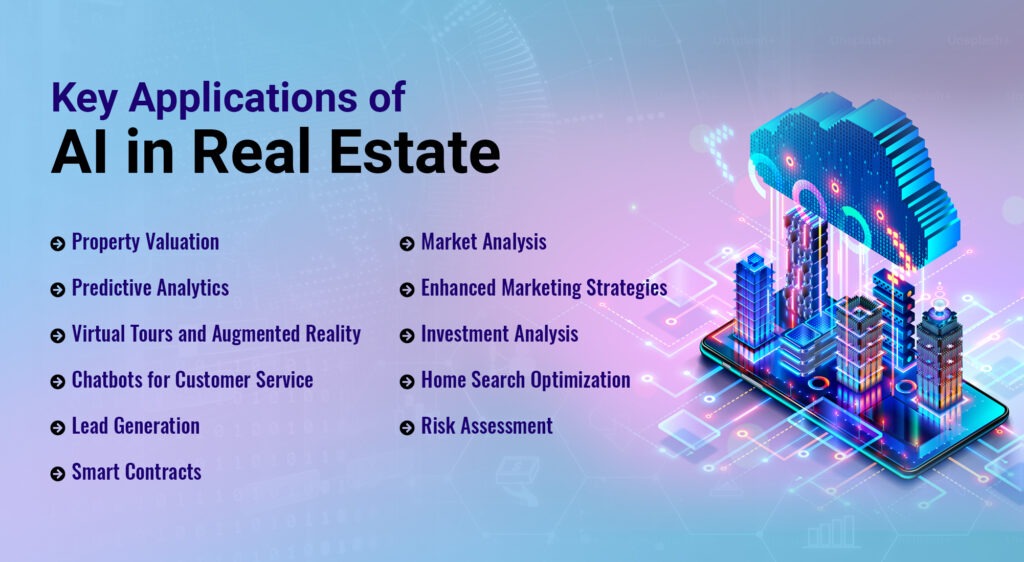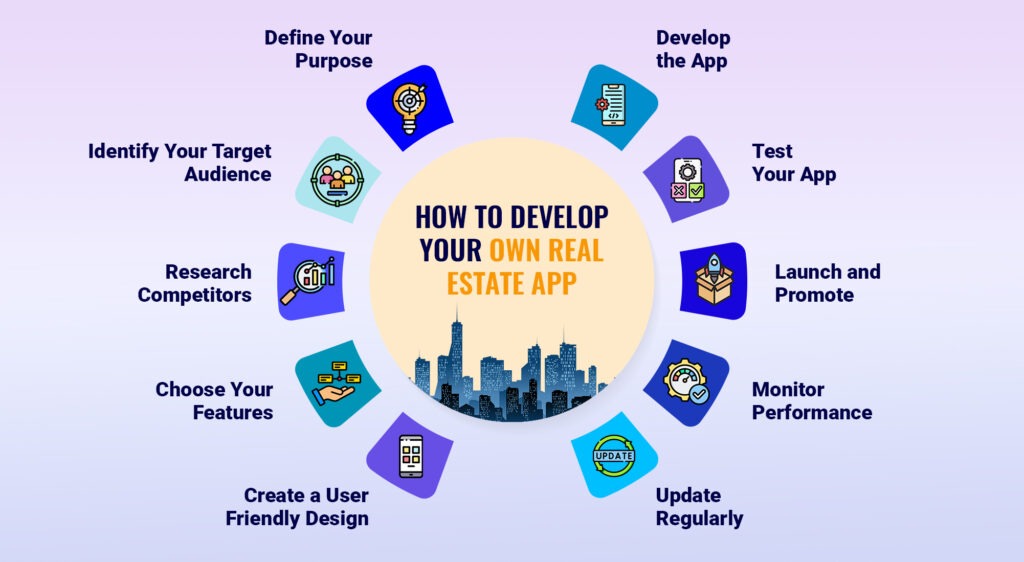AI is transforming how we buy, sell, and manage properties. But what does “AI in real estate” really mean? It involves using smart algorithms and data analysis to improve various processes, from property valuations to client interactions.
The importance of AI for real estate is hard to ignore. The AI real estate market is predicted to increase to $731.59 billion by 2028, with a cumulative annual growth rate (CAGR) of 34%.
For example, AI tools can help agents provide better service by quickly analyzing market trends. This means they can offer clients the most accurate property valuations and recommend listings that match their preferences.
Additionally, partnering with a reliable real estate app development company can further enhance these AI capabilities.
This article will explore key AI applications in real estate, showcasing real-world examples that highlight its benefits.
Let’s dive into how AI is shaping the future of real estate!
What Does AI for Real Estate Industry Mean?
Data management is a challenge in real estate. Real estate agents have to keep track of listings, client preferences, and market trends, which can be overwhelming. Artificial intelligence helps by organizing this data efficiently. With AI tools, agents can easily access the information they need, saving time and effort.
Another issue is inaccurate property valuations. Traditional methods can take a long time and may not always be correct. AI uses algorithms to analyze sales data and market conditions, leading to more accurate property appraisals. This helps buyers and sellers make better decisions.
AI also improves the buyer-seller experience. Chatbots powered by AI can answer questions anytime, providing instant support for potential buyers. This quick access to information makes clients happier and allows agents to focus on more complex tasks.
For brokers and agents, the benefits of AI in real estate are clear. AI tools streamline property searches, matching clients with the best listings. Instead of sorting through many options, agents can quickly find properties that fit their clients’ needs, increasing the chances of closing deals.
Investors can use AI for real estate investing as well. By analyzing market trends and property data, Artificial Intelligence can help identify good investment opportunities. For example, an investor can check rental potential or predict future property values, leading to smarter choices.
Elevate Your Real Estate Business With The Power Of AI.
Our Expert Solutions Streamline Operations, Enhance Decision-Making, And Drive Growth.
Contact Us Today.Real-World Examples of AI in Real Estate
AI is transforming how real estate companies operate, with top brands using AI-driven applications to improve both client experiences and back-end operations.
Zillow: What is Zillow Doing With AI

Zillow, for instance, uses AI to offer accurate home valuations. Its “Zestimate” feature analyzes millions of data points from public records and real estate trends to provide price estimates for properties.
This tool gives buyers and sellers a clearer idea of property values without needing a full appraisal, making the process quicker and more transparent. Businesses looking to build an app like Zillow can leverage similar AI-driven models to deliver smarter real estate experiences.
For users, this is a major benefit as it removes some of the guesswork in property valuations.
Redfin: Enhancing the Property Search Experience

Redfin, another leader in the real estate industry, relies on AI for market predictions and to streamline the buying process. It uses artificial intelligence in real estate to match clients with properties that meet their criteria.
By analyzing previous user interactions and property preferences, Redfin’s algorithms suggest homes that clients are more likely to love. This approach also supports real estate agents, giving them tools that help them focus on properties most likely to meet their clients’ needs.
Compass: Empowering Agents with Advanced Tools

Compass has also embraced AI in real estate by developing an advanced platform for real estate agents. The platform offers tools like automated pricing suggestions, predictive analytics, and targeted marketing strategies, allowing agents to work smarter and faster.
These AI applications in real estate make it possible for agents to serve clients more effectively, especially in competitive markets. Compass agents can reach more potential buyers through AI-driven marketing. They help sellers achieve better results.
Benefits of AI in Real Estate
For Real Estate Agents:
- Better Client Engagement: AI helps agents understand what clients want, so they can suggest the right properties.
- Efficient Property Listings: Automating the listing process saves time, allowing agents to focus on helping clients.
- Market Insights: AI gives agents valuable information about market trends to help them advise clients better.
For Investors:
- Improved Risk Analysis: AI looks at a lot of data to help investors assess risks, making it easier to choose good investments.
- Accurate Predictions: Investors can use AI to spot trends and predict future property values, leading to smarter choices.
- Enhanced Investment Opportunities: AI can find promising investment options, helping investors earn more.
For Property Managers:
- Reduced Maintenance Costs: AI predicts when repairs are needed, helping prevent big issues before they happen.
- Enhanced Tenant Satisfaction: Timely repairs keep tenants happy, making them more likely to stay longer.
- Property Value Preservation: Happy tenants and well-maintained properties help keep property values high.
The Takeaway!
- Streamlined Processes: AI makes real estate operations easier and faster for everyone involved.
- Better Decision-Making: Data from AI helps all players in the real estate industry make smarter choices.
Also Read: The benefits of having a mobile app in real estate business
Challenges and Limitations of Artificial Intelligence in Real Estate
| Challenge | Description | Impact on Real Estate |
| Data Privacy Concerns | AI collects and analyzes large amounts of personal data, raising questions about its use and protection. | Can lead to trust issues between clients and agents. |
| Ethical Considerations | Algorithms may reflect biases in training data, affecting recommendations. | Potentially harms clients and creates market inequalities. |
| High Implementation Costs | Larger firms can afford AI technology, while smaller firms may struggle with costs. | Smaller firms may be at a competitive disadvantage. |
| Dependency on Quality Data | AI relies on accurate and complete data for reliable results. | Poor data quality can lead to misleading valuations and insights. |
| Integration Challenges | Existing systems may not easily accommodate new AI technology, requiring training and adjustments. | Resistance from staff and increased transition time. |
Top Trends In AI and Real Estate
Artificial Intelligence is set to transform the real estate industry in exciting ways. Emerging trends show that technology will play a bigger role in how we buy, sell, and manage properties.

Enhanced Property Management
One of the biggest advancements will be the use of AI for property management. Smart building systems can monitor energy use and maintenance needs. For example, a building can alert managers when systems need repairs, saving time and money.
Smarter Real Estate Investing
AI will improve real estate investing. Investors will have better tools to analyze market trends and property values. AI can sift through data quickly, helping investors find profitable opportunities. Imagine using an app that tells you which neighborhoods are about to rise in value. This can change how investors make decisions.
Immersive Property Tours
AI applications in real estate are expected to grow, leading to more advanced real estate app features that cater to evolving user needs. Virtual reality (VR) combined with AI will create immersive property tours. Buyers can explore homes from anywhere, making the search process easier. This technology can save agents time and help clients feel more confident in their choices.
Personalized Marketing Strategies
Another trend is the rise of personalized marketing. AI can analyze buyer behavior and preferences. This means real estate agents can send targeted listings to potential clients. If someone is looking for a family home in a specific area, agents can quickly provide options that fit those needs.
Predictive Analytics for Market Trends
As AI technology advances, we can expect more predictive analytics in real estate. These tools will help agents and buyers forecast market trends. For instance, if AI predicts a rise in rental demand in a city, investors can act fast to secure properties before prices go up.
Ready To Harness The Power Of AI?
Appverticals Offers Tailored AI Integration Solutions To Meet Your Specific Needs.
We’ve Got You Covered11 Key Applications of AI in Real Estate
AI is making a big impact in real estate with its various applications. These tools are transforming how agents work and how clients find their dream homes.

1. Property Valuation
AI helps make property valuation easier and more accurate. Traditional methods can take a long time and may not be very precise. Studies show that AI can cut appraisal errors by up to 30%. For instance, Zillow uses AI to analyze sales data and property features. This way, agents can suggest the best price for homes.
Best Practice: Real estate agents should use AI tools to get accurate property values. These tools can help them make better pricing decisions, which builds trust with clients.
2. Predictive Analytics
Predictive analytics uses past data to forecast future trends. A study by PwC concluded that real estate agents using AI tools can increase their sales by 20%. For example, Redfin uses AI to find neighborhoods that might see price increases soon. This helps agents give clients good advice on when to buy or sell.
Best Practice: Agents should engage with predictive analytics tools regularly. By doing so, they can help clients find the best investment opportunities.
3. Virtual Tours and Augmented Reality
Virtual tours and augmented reality (AR) are changing how properties are shown. Listings with virtual tours get 87% more views than those without. Companies like Matterport offer 3D tours that let buyers explore homes online. This makes it easier for clients to see a property before scheduling a visit.
Best Practice: Agents should invest in high-quality virtual tour technology. Encouraging clients to use these tools can make their property search more enjoyable.
4. Chatbots for Customer Service
AI chatbots provide quick customer support. Research shows that 80% of companies will use chatbots to handle simple questions by 2025. For example, Realtor.com uses chatbots to answer common questions and help schedule property viewings. This means clients can get help anytime.
Best Practice: Real estate agents should add chatbots to their websites. This allows them to focus on more complicated client needs while ensuring quick responses.
5. Lead Generation
AI tools improve lead generation by finding potential clients faster. Businesses that use AI for leads can boost efficiency by 50%. For example, HubSpot uses AI to analyze data and find leads likely to convert. This helps agents focus their efforts where they matter most.
Best Practice: Agents should use AI tools to generate leads and create targeted marketing campaigns. Regularly checking analytics can help refine their approach.
6. Smart Contracts
Smart contracts use AI to automate property transactions. They can speed up deals and reduce errors. For example, Propy uses smart contracts to make buying and selling homes easier and safer. This helps prevent fraud and ensures a smooth process.
Best Practice: Real estate professionals should learn about smart contracts. Integrating them into their processes can make transactions faster and more transparent.
7. Market Analysis
AI can quickly analyze lots of market data. Studies show that using AI for market analysis can improve decision-making by 15-20%. CoreLogic uses AI to give agents insights into local market trends, helping them guide their clients effectively.
Best Practice: Agents should regularly check market analysis tools to stay informed. This helps them adjust their strategies and provide valuable advice to clients.
8. Enhanced Marketing Strategies
AI creates personalized marketing campaigns that connect with buyers. Personalized ads can increase conversion rates by 10-15 times. Platforms like Facebook and Google help agents reach the right people using AI technology.
Best Practice: Agents should use AI analytics to develop targeted marketing campaigns. This helps increase engagement and improves the chances of closing sales.
9. Investment Analysis
AI tools help investors analyze properties better. Research shows that AI can improve investment returns by 20% by evaluating rental income and property value. Roofstock uses AI to help investors understand the best properties to buy.
Best Practice: Investors should use AI tools to assess financial data before making purchases. Regular analysis leads to smarter investment choices.
10. Home Search Optimization
AI makes the home search process smoother by matching buyers with properties that fit their needs. Buyers using AI tools save about 30% of their time searching. Realtor.com uses AI to show listings that match what buyers are looking for.
Best Practice: Agents should encourage clients to use AI search tools to make their home-buying experience faster and easier. Providing support for these tools can enhance client satisfaction.
11. Risk Assessment
AI can help assess risks related to properties, making it easier for investors to make safe choices. AI can reduce investment risk by 25%. Companies like HouseCanary offer tools that analyze factors like neighborhood safety and local economy.
Best Practice: Investors should regularly use AI risk assessment tools to evaluate properties before buying. Understanding these risks can help them make smarter investments.
Also Read: Real Estate Apps For Realtors
How to Develop Your Own Real Estate App? 10 Steps To Follow!

Creating your own real estate app can seem challenging, but breaking it down into clear steps can make it easier. Here’s how to get started and make your app stand out in the real estate industry.
1. Define Your Purpose
First, think about what your app will do. Will it help buyers find homes, assist agents with listings, or provide market analysis? Knowing your purpose will help you decide which features to include.
2. Identify Your Target Audience
Understanding your target audience is crucial. Are you building your app for first-time homebuyers, real estate agents, or investors?
For example, an app aimed at first-time buyers might focus on education and user-friendly features, while an app for investors could focus on market trends and investment analysis.
3. Research Competitors
Look at other real estate apps to see what works and what doesn’t. Apps like Realtor.com and Redfin have features that attract users. Identify gaps that your app could fill.
This could be anything from a unique property search tool to AI-driven insights that improve the buyer-seller experience in the real estate industry.
4. Choose Your Features
Decide which features your app will offer. Here are some of the best and top features to include:
- Property Listings
- Search Filters
- Virtual Tours
- AI-Powered Recommendations
- Real-Time Notifications
- Interactive Maps
- User Reviews and Ratings
- Document Management
- Chat Support
- Market Insights
5. Create a User-Friendly Design
Your app should be easy to navigate. A clean design helps users find what they need quickly. Use large buttons, clear fonts, and simple layouts.
For instance, apps like OpenDoor use straightforward designs that make finding properties easy and are great examples of effective real estate AI applications.
6. Develop Real Estate App
You have two main options for development: hire a developer or use a no-code platform. If you hire a developer, make sure they understand the real estate industry and AI applications in real estate.
If you choose a no-code platform, tools like AppGyver or Bubble can help you create an app without extensive programming knowledge.
Also Read: How to code an app
7. Test Your App
Before launching, test your app with real users. Gather feedback on usability and features. This step is vital for identifying any issues. Make necessary adjustments based on user input.
Testing can help ensure your app is user-friendly and effective, benefiting both clients and agents.
8. Launch and Promote
Once your app is ready, launch it on app stores like Google Play and Apple App Store. Promote it on social media and through local real estate networks.
Share success stories and testimonials to attract more users. Showcasing the benefits of AI in real estate through your app can boost its appeal.
9. Monitor Performance
After launch, keep track of how your app performs. Use analytics tools to see how users engage with your app. Look at download rates, user retention, and feedback. This data will help you improve your app over time.
10. Update Regularly
The real estate industry and technology are always changing. Keep your app updated with new features and improvements. Regular updates can help maintain user interest and keep your app competitive.
Staying ahead of trends in AI for real estate will ensure your app remains relevant.
With a well-thought-out app, you can make your mark in the real estate industry and enhance the benefits of AI in real estate for everyone involved.
Also Read: Real Estate App Development Cost
Transform Your Real Estate Business With A Powerful Mobile App.
From Property Listings To Virtual Tours, We’ll Create A Seamless Digital Experience That Sets You Apart.
Let’s Get Started.How Can AppVerticals Help Make the Best Real Estate App?

AppVerticals stands out as a leader in app development, ready to help you create the best app for your needs. We know that every project is different, and we make sure to grasp your goals clearly.
We specialize in AI applications in real estate, ensuring your app can leverage the latest technology. For example, if you want an app that uses AI for property searches or real estate investing, we can integrate features that provide smart recommendations. This not only enhances user experience but also improves engagement.
With our experience in AI for real estate, we help you add valuable features. Imagine an app that can analyze property values in real-time or provide insights based on market trends.
As trends shift in real estate and AI, we’ll ensure your app stays relevant.
By choosing AppVerticals, you partner with a dedicated team that understands your needs. Contact Now!








